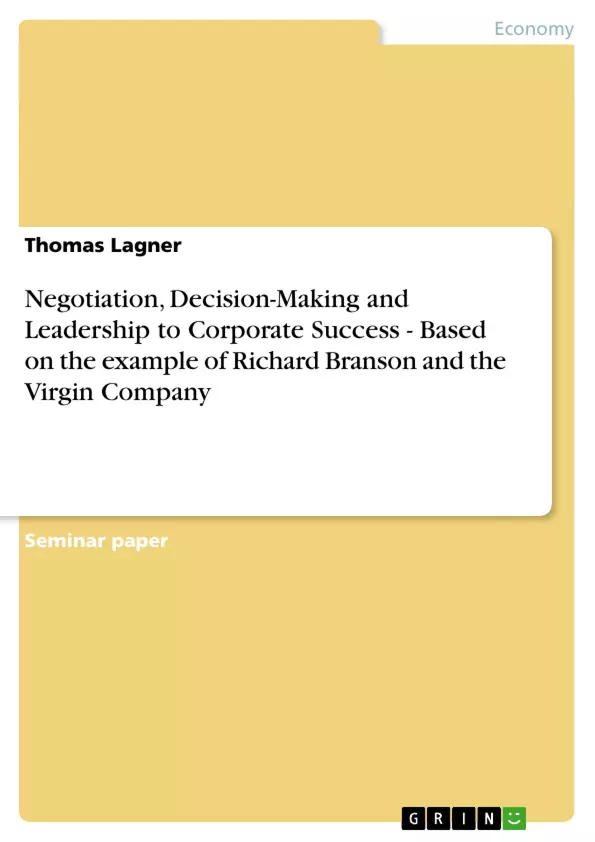This paper aims at exploring the underlying decision-making processes that take place in order to successfully develop and run this organization even in the most competitive markets such as in entertainment or air travel (Dearlove 1999, 12). However, to understand the power and culture this organization is driven by to achieve this success, one has literally to get a grip on its key player, Richard Branson. My analysis of the Virgin Group is therefore closely tied to Richard’s way of doing business and making decisions.
Inhaltsverzeichnis (Table of Contents)
- BOARDING
- MON(I) A Virgin Everywhere!
- (II) Richard's Three Pillars
- (1) The Power of Negotiation
- (2) The Power of Experience
- (3) The Power of Difference
- (4) Branson's' Philosophy to Life and People
- (5) Virgin: a self-fulfilling success story
- (III) Richard Branson: Virgin's greatest strength and weakness
Zielsetzung und Themenschwerpunkte (Objectives and Key Themes)
This paper aims to explore the decision-making processes that enable the successful development and management of the Virgin Group, even within highly competitive industries like entertainment and air travel. To understand the driving force behind this organization's power and culture, a close examination of Richard Branson's leadership style and decision-making is crucial.
- The importance of negotiation in achieving success
- The role of experience in shaping business decisions
- The significance of differentiation and innovation in the Virgin Group's strategy
- The impact of Richard Branson's unique leadership philosophy on the Virgin Group's culture and performance
- The self-reinforcing nature of the Virgin Group's success story
Zusammenfassung der Kapitel (Chapter Summaries)
- MON(I) A Virgin Everywhere!: This chapter introduces the Virgin Group and its founder, Richard Branson, by showcasing the wide range of Virgin-branded products and services that are interwoven into the daily life of an individual. This section highlights Branson's vision of providing a unique life experience for customers rather than simply selling products.
- (II) Richard's Three Pillars: This section delves into the core principles underlying Richard Branson's success. It examines the significance of negotiation, experience, and differentiation as key pillars in the Virgin Group's strategy. This chapter explores how Branson’s philosophy, encompassing his views on life and people, contributes to the Virgin Group’s unique approach to business. Additionally, it analyzes the self-reinforcing nature of the Virgin Group's success story.
- (III) Richard Branson: Virgin's greatest strength and weakness: This chapter explores the multifaceted role of Richard Branson within the Virgin Group. It analyzes his strengths and weaknesses as a leader, considering his contributions to the organization’s success as well as the potential challenges associated with his leadership style.
Schlüsselwörter (Keywords)
The main keywords and focus topics of the paper include negotiation, decision-making, leadership, corporate success, Virgin Group, Richard Branson, entrepreneurialism, innovation, brand building, and customer experience. The paper explores the interplay of these factors in shaping the Virgin Group's remarkable success.
Frequently Asked Questions
What are Richard Branson's "Three Pillars" of success?
The three pillars identified in the analysis are the Power of Negotiation, the Power of Experience, and the Power of Difference (innovation/differentiation).
How does the Virgin Group approach customer experience?
Branson focuses on providing a unique life experience and lifestyle through the brand, rather than just selling a commodity or service.
What is considered Branson's greatest strength and weakness?
His charismatic leadership and personal brand are his greatest strengths, but they also create a dependency on his persona, which can be a strategic weakness for the group's long-term autonomy.
Why is negotiation so central to the Virgin Company?
Negotiation is the tool Branson used to enter highly competitive markets like air travel, often securing favorable terms that allowed the company to challenge established giants.
What is Branson's philosophy regarding people?
He believes in empowering employees and maintaining a positive, entrepreneurial culture that values human relationships as much as profit.
- Quote paper
- Thomas Lagner (Author), 2006, Negotiation, Decision-Making and Leadership to Corporate Success - Based on the example of Richard Branson and the Virgin Company, Munich, GRIN Verlag, https://www.grin.com/document/62147



